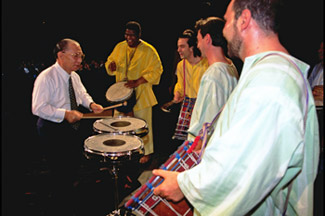Peace, Culture and Education: The Flowering of a New Humanism (Chapter 28)
The power of culture can be hard to discern, but it is a force that illuminates the innermost depths of people's hearts, draws forth their wisdom and ingenuity, and shapes the deep underlying currents that will steadily but surely move human history in the direction of peace and prosperity for all.
It has always been President Ikeda's conviction that the Soka Gakkai's culture-related activities are a way to communicate in an accessible fashion the joy and elevated life state attained through Buddhist faith and practice. In accord with his guidance, the Soka Gakkai has promoted a grassroots cultural movement through holding such events as peace culture festivals and large-scale youth festivals. At a headquarters leaders meeting commemorating the 50th anniversary of the establishment of the young men's and young women's divisions, President Ikeda speaks of the significance of the Soka Gakkai's cultural activities as represented by the Music Corps and the Fife and Drum Corps.
SGI President Ikeda's Guidance
From a speech delivered at a Soka Gakkai Headquarters leaders meeting, Tokyo, November 12, 2001.
Many thanks to the young men's Music Corps, brilliant musicians of kosen-rufu! Founded in May 1954, the Music Corps has consistently inspired and encouraged our members with its rousing performances for almost five decades. I would like to present them with the following poem:
Ah, the Music Corps!
and its melodies of the Buddhas and heavenly deities
even amid the storm . . .
On the day of the Osaka Rally (July 17, 1957),[1] members of the Music Corps gathered from early in the morning on the riverbank in Osaka's Nakanoshima. There, they played Soka Gakkai songs with all their might, hoping that their music would reach me where I was being held [in detention on false charges by the authorities]. I could hear them very clearly. I will never forget that courageous sound.
My thanks, too, to the young women's Fife and Drum Corps, those heavenly emissaries of peace. I would like to praise them with the poem:
The Fife and Drum Corps—
Shining vibrantly
in this tumultuous world.
One has but to mention the Fife and Drum Corps and everyone wants to go and hear them play. The members have accumulated immense benefits as a result of steadfastly spreading the light of peace.
It was in 1956, in our humble home in Kobayashi-cho in Tokyo's Ota Ward, that my wife and I, along with several representatives of the young women's division, discussed ideas for forming such a group. That was the beginning of today's Fife and Drum Corps.
Bodhisattva Wonderful Sound, who appears in the Lotus Sutra, is said to be accompanied wherever he goes by the music of hundreds and thousands of heavenly musicians.
["Bodhisattva Wonderful Sound," the 24th chapter of the Lotus Sutra, says: "The lands that he (Bodhisattva Wonderful Sound) passed through on his way quaked and trembled in six different ways, and in all of them seven-jeweled lotus flowers rained down and the instruments of hundreds and thousands of heavenly musicians sounded of themselves without having been struck" (The Lotus Sutra and Its Opening and Closing Sutras, p. 334).]
In one of his writings, Nichiren Daishonin cites the words, "We can discern a country's rise and fall by whether its tones are happy or sad" (Gosho zenshu, p. 88).[2] Namely, the sounds prevailing in society at any given time can help us understand a country's future, whether it is destined to flourish or decline. These sounds are the sounds of human voices and, by extension, of culture and the arts, including, of course, music.
Kosen-rufu is a great cultural movement that deeply values music and the arts.
It was based on the fundamental values and principles of Buddhism that I established the Music Corps and the Fife and Drum Corps.
When I asked second Soka Gakkai President Josei Toda if I could do so, he simply said, "If you'll take full responsibility, Daisaku, go right ahead!" I purchased a few instruments out of my own pocket and donated them to the original members—16 in the Music Corps and 33 in the Fife and Drum Corps. Today, these groups together boast some 20,000 members in Japan, and many of their constituent groups have won top prizes in national competitions.
These achievements are remarkable. The activities of the members of those groups in themselves constitute a great artistic and cultural movement. This network of wonderful sound has today spread to some 30 countries and territories. Time and again, SGI Music Corps and Fife and Drum Corps groups around the world have taken part in important national events and won high acclaim, creating a superlative record of achievement. I would like to wholeheartedly applaud these groups for becoming the best in the world.
28.13 ■ Reviving the Poetic Spirit
President Ikeda has stressed that one means for reviving contemporary civilization is restoring the poetic spirit—the topic of this column he contributed to The Japan Times, an English-language newspaper published in Japan.
SGI President Ikeda's Guidance
Adapted from an essay titled "Restoring Our Connections with the World," published in The Japan Times, on October 12, 2006.[3]
In the sea of sky
The waves of cloud rise up,
And the moon-boat
Is seen rowing out of sight
Into the forest of stars.[4]
This waka-style poem was written some 1,300 years ago. It is included in the Man'yoshu ("A Collection of Ten Thousand Leaves"), the oldest extant collection of Japanese poems.
Today, we have sent human beings beyond the reaches of Earth's atmosphere; we have stood on the surface of the moon. Yet, reading this poem, one has to wonder if people in ancient times didn't sense the presence of the moon and stars more intimately than we do today. Is it possible they lived richer, more expansive lives than we, who for all our material comfort, rarely remember to look up to the sky?
Immersed in material distractions, clamor and bustle, contemporary humanity has been cut off from the vastness of the universe, from the eternal flow of time. We struggle against feelings of isolation and alienation. We seek to quench the heart's thirst by pursuing pleasures, only to find that our cravings have grown that much more fierce.
This separation and estrangement is, in my view, the underlying tragedy of contemporary civilization. Divorced from the cosmos, from nature, from society and from each other, we have become fractured and fragmented.
Science and technology have given humanity undreamed-of power, bringing invaluable benefits to our lives and health. But this has been paralleled by a tendency to distance ourselves from our surroundings, to objectify and reduce everything around us to numbers and things. Even people become things. The victims of war are presented as statistics; we are numbed to individual realities of unspeakable suffering and grief.
In contrast, the eyes of a poet discover in each person a unique and irreplaceable humanity. While arrogant intellect seeks to control and manipulate the world, the poetic spirit bows with reverence before its mysteries.
Human beings are each a microcosm. Living here on Earth, we breathe the rhythms of a universe that extends infinitely above us. When resonant harmonies arise between this vast outer cosmos and the inner human cosmos, poetry is born.
At one time, perhaps, all people were poets, in intimate dialogue with Nature. In Japan, the Man'yoshu collection comprise poems written by people of all classes. And almost half of the poems are marked "poet unknown."
These poems were not written in order to leave behind a name. Poems and songs penned as an unstoppable outpouring of the heart take on a life of their own. They transcend the limits of nationality and time as they pass from person to person, from one heart to another.
The poetic spirit can be found in any human endeavor. It may be vibrantly active in the heart of a scientist engaged in research in the awed pursuit of truth. When the spirit of poetry lives within us, even objects do not appear as mere things; our eyes are trained on an inner spiritual reality. A flower is not just a flower. The moon is no mere clump of matter floating in the skies. Our gaze fixed on a flower or the moon, we intuitively perceive the unfathomable bonds that link us to the world.
In this sense, children are poets by nature, by birth. Treasuring and nurturing their poetic hearts, enabling them to grow, will also lead adults into realms of fresh discovery. We do not, after all, exist simply to fulfill desires. Real happiness is not found in more possessions, but through creating a harmony with the world at the core of our being.
The poetic spirit has the power to "retune" and reconnect a discordant, divided world. True poets stand firm, rooted in life's complex, conflicted, and fissured reality. Harm done to anyone, anywhere, causes agony in the poet's heart. Yet, the poet intrepidly steps forward to offer people words of courage and hope, seeking to share a perspective—one step deeper, one step higher—that enables them to perceive the enduring spiritual realities of our lives.
Now more than ever, we need the thunderous, rousing voice of poetry. We need the poet's impassioned songs of peace, of the shared and mutually supportive existence of all things. We need to reawaken the poetic spirit within us, the youthful, vital energy and wisdom that enable us to live to the fullest. We must all be poets.
Our planet is scarred and damaged, its ecosystems threatened with collapse. We must shade and protect Earth with "leaves of language" arising from the depths of life. Modern civilization will be healthy only when the poetic spirit regains its rightful place.



